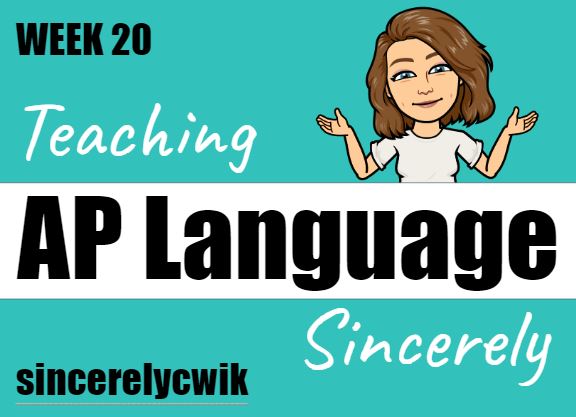|
Ok. New semester and that means a new type of unit! I have dabbled with the idea of themed or topical units for a couple years. However, I usually keep my skills focus. For instance, last year my students did a documentary unit which was really about analyzing and creating visual arguments. Not this year! Our topic is… ACTIVISM! I am fairly opinionated - insert smirk - so if I walk away from a year of AP with nothing else, I want them to embrace their own opinions and express them! (You can imagine my face when, at the beginning of the year, they couldn’t think of ideas for their “My Dream for America” speeches). In our current climate, activism is everywhere, so I’m going to jump on it. Week 20The first section of our activism unit is to analyze the rhetoric of known activists (leading up to the Chavez rhetorical analysis prompt next week). So, this week we are studying “How to Fight” by Clint Smith III as an introduction to the unit. Then, we’re tackling Harvey Milk’s Hope speech as a mentor text for their own campaign speeches. I won’t lie. I am actually really excited for this week. Lesson PlansThis unit pretty much embodies all those BIG ROCKS of my teaching.
I want them to care about the world around them. I want them to have opinions that they can validate and justify I want them to stand up for what they know is right. I want them to be critical readers and listeners. So pretty much, I am pruning my own little activists. Ha! Teaching AP Language allows me the freedom to adapt to the world my kids are experiencing every day. That’s not the case with our regimented, “common” traditional English options. Too often, in trying to be consistent between teachers and classes, we revoke too much of the freedom. If one size fits all doesn’t work for kids, why do we pretend it will for teachers?
2 Comments
11/14/2019 01:35:45 pm
These are fantastic resources, thank you so much for building such activism in our youth as well as sharing powerful resources with fellow teachers.
Reply
Leave a Reply. |
Archives
February 2024
AuthorSteph Cwikla has been a teacher since 2012, focusing on ELA curriculum. Now, she also works as an instructional coach, helping other teachers improve engagement and instruction. |


 RSS Feed
RSS Feed